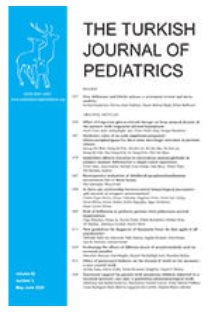The causes of parental vaccine refusal: results of a survey from Giresun, Turkey
___
1. Fine-Goulden M. Should childhood vaccination be compulsory in the UK? Opticon1826 2010.. Doi:10.5334/opt.081003.2. WHO. World Immunization Week 2016: close the immunization gap.Available at http://www.who.int/ campaigns/immunization-week/2016/en/ (Accessed on May 4, 2020).
3. Baguune B, Ndago JA, Adokiya MN. Immunization dropout rate and data quality among children 12-23 months of age in Ghana. Arch Public Health 2017; 75: 18.
4. Andrews-Chavez J, Biswas A, Gifford M, Eriksson C, Dalal K. Identifying households with low immunisation completion in Bangladesh. Health 2012; 4: 1088-1097.
5. My C, Danchin M, Willaby HW, Pemberton S, Leask J. Parental attitudes, beliefs, behaviours and concerns towards childhood vaccinations in Australia: a national online survey. Aust Fam Physician 2017; 46: 145-151.
6. Frew PM, Fisher AK, Basket MM, et al. Changes in childhood immunization decisions in the United States: results from 2012 & 2014 National Parental Surveys. Vaccine 2016; 34: 5689-5696.
7. Succi RCM. Vaccine refusal-what we need to know. J Pediatr 2018; 94: 574-581.
8. Gesser-Edelsburg A, Shir-Raz Y, Green MS. Why do parents who usually vaccinate their children hesitate or refuse? General good vs. individual risk. J Risk Res 2016; 19: 405-424.
9. Kelley CA, Velazco CS, Delaney TV, et al. Factors contributing to suboptimal rates of childhood vaccinations in Vermont. J Child Health Care 2015; 19: 558-568.
10. McKee C, Bohannon K. Exploring the reasons behind parental refusal of vaccines. J Pediatr Pharmacol Ther 2016; 21: 104-109.
11. Gülcü S, Arslan S. Çocuklarda aşı uygulamaları: güncel bir gözden geçirme. Düzce Üniversitesi Sağlık Bilimleri Enstitüsü Dergisi 2018; 8: 34-43.
12. Yalçin SS, Bakacak AG, Topaç O. Unvaccinated children as community parasites in National Qualitative Study from Turkey. BMC Public Health 2020; 20: 1087.
13. Bozkurt HB. Aşı reddine genel bir bakış ve literatürün gözden geçirilmesi. Kafkas Tıp Bilimleri Dergisi 2018; 8: 71-76.
14. Üzüm Ö, Eliaçık K, Örsdemir HH, Karadağ Öncel E. Ebeveynlerin aşı yaklaşımlarını etkileyen faktörler: bir eğitim araştırma hastanesine ilişkin değerlendirme. Çocuk Enfeksiyon Dergisi 2019; 13: 144-149.
15. Henrikson NB, Anderson ML, Opel DJ, Dunn J, Marcuse EK, Grossman DC. Longitudinal trends in vaccine hesitancy in a cohort of mothers surveyed in Washington State, 2013-2015. Public Health Rep 2017; 132: 451-454.
16. Zuzak TJ, Zuzak-Siegrist I, Rist L, Staubli G, SimoesWüst AP. Attitudes towards vaccination: users of complementary and alternative medicine versus non-users. Swiss Med Wkly 2008; 138: 713-718.
17. Napolitano F, D’Alessandro A, Angelillo IF. Investigating Italian parents’ vaccine hesitancy: a cross-sectional survey. Hum Vaccin Immunother 2018; 14: 1558-1565.
18. Alsubaie SS, Gosadi IM, Alsaadi BM, et al. Vaccine hesitancy among Saudi parents and its determinants. Results from the WHO SAGE working group on vaccine hesitancy survey tool. Saudi Med J 2019; 40: 1242-1250.
19. DeStefano F. Vaccines and autism: evidence does not support a causal association. Clin Pharmacol Ther 2007; 82: 756-759.
20. Doja A, Roberts W. Immunizations and autism: a review of the literature. Can J Neurol Sci 2006; 33: 341-346.
21. Topçu S, Almış H, Başkan S, Turgut M, Orhon FŞ, Ulukol B. Evaluation of childhood vaccine refusal and hesitancy intentions in Turkey. Indian J Pediatr 2019; 86: 38-43.
22. Salmon DA, Dudley MZ, Glanz JM, Omer SB. Vaccine hesitancy: causes, consequences, and a call to action. Am J Prev Med 2015; 49: S391-S398.
23. Frew PM, Lutz CS. Interventions to increase pediatric vaccine uptake: an overview of recent findings. Hum Vacc Immunother 2017; 13: 2503-2511.
24. Smith LE, Amlôt R, Weinman J, Yiend J, Rubin GJ. A systematic review of factors affecting vaccine uptake in young children. Vaccine 2017; 35: 6059-6069.
25. Petrelli F, Contratti C, Tanzi E, Grappasonni I. . Vaccine hesitancy, a public health problem. Ann Ig 2018; 30: 86-103.
26. Repalust A, Šević S, Rihtar S, Štulhofer A. Childhood vaccine refusal and hesitancy intentions in Croatia: insights from a population-based study. Psychol Health Med 2017; 22: 1045-1055.
27. Sweileh WM. Bibliometric analysis of global scientific literature on vaccine hesitancy in peerreviewed journals (1990–2019). BMC Public Health 2020; 20: 1252.
28. Meppelink CS, Smit EG, Fransen ML, Diviani N. I was right about vaccination: confirmation bias and health literacy in online health information seeking. J Health Commun 2019; 24: 129-140.
29. Ahmed A, Lee KS, Bukhsh A, et al. Outbreak of vaccine-preventable diseases in Muslim majority countries. J Infect Public Health 2018; 11: 153-155.
30. Costa JC, Weber AM, Darmstadt GL, Abdalla S, Victora CG. Religious affiliation and immunization coverage in 15 countries in Sub-Saharan Africa. Vaccine 2020; 38: 1160-1169.
31. Padela AI, Furber SW, Kholwadia MA, Moosa E. Dire necessity and transformation: entry-points for modern science in Islamic bioethical assessment of porcine products in vaccines. Bioethics 2014; 28: 59- 66.
32. Jarrett C, Wilson R, O’Leary M, Eckersberger E, Larson HJ; SAGE Working Group on Vaccine Hesitancy.Strategies for addressing vaccine hesitancy–A systematic review. Vaccine 2015; 33: 4180-4190.
- ISSN: 0041-4301
- Yayın Aralığı: 6
- Başlangıç: 1958
- Yayıncı: Hacettepe Üniversitesi Çocuk Sağlığı Enstitüsü Müdürlüğü
Hayrunnisa BEkİS BOZKURT, Yavuz ŞAHİN
Congyang HUANG, Hanshan LİU, Honglian HU, Li JİA, Suyun HU
Mine Kanat PEKTAŞ, Mehmet Gazi BOYACI, Hilal KOYUNCU, Ahmet Afşin KUNDAK, Ayhan PEKTAŞ
The causes of parental vaccine refusal: results of a survey from Giresun, Turkey
Özlem TERZİ, Elif Nur GÜLEN, Cihad DÜNDAR
Severe isolated sulfide oxidase deficiency with a novel mutation
Meriç ERGENE, Nuriye YARAR, Elif Perihan ÖNCEL, Büşranur ÇAVDARLI, İsmail Zafer ECEVİT, Taner SEZER, Halil İbrahim AYDIN
Berrak Bilginer GÜRBÜZ, Ali DURSUN, Turgay COŞKUN, Can KOŞUKCU, Didem Yücel YILMAZ, Rıza Köksal ÖZGÜL, Ayşegül TOKATLI, Hatice Serap SİVRİ
Lijalem Melie TESFAW, Muluwerk Ayele DEREBE, Haile Mekonnen FENTA
Selcen Yaroğlu KAZANCI, Neslihan ÖZKUL SAĞLAM, Sadık Sami HATİPOĞLU, Sema AKSOY, Figen PALABIYIK, Ercan İNCİ
Expression of MicroRNA 146a, 155, 181 and 223 in febrile seizure
Kürşat Bora ÇARMAN, Yasemin KARAL, Gül Gülen MERT, Arzu EKİCİ, Peren PERK, Didem ARSLANTAŞ, Coskun YARAR, Ener Çağrı DİNLEYİCİ
